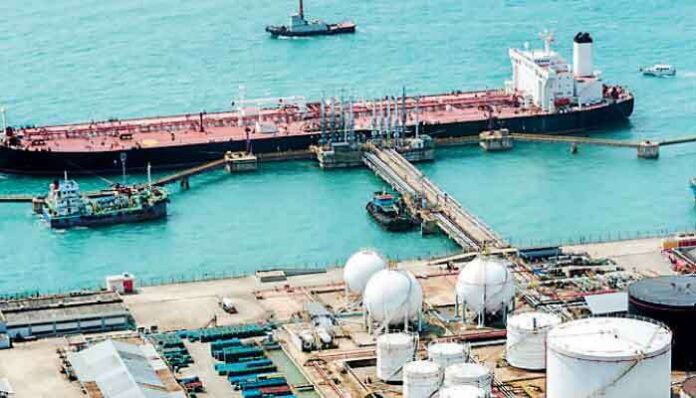By: Staff Writer
August 24, Colombo (LNW): Sri Lanka took a significant step toward strengthening its position in the regional maritime industry this week, with the Ceylon Petroleum Corporation (CPC) and its subsidiary, the Petroleum Storage Terminals Company (PSTC), unveiling an expanded pipeline and bunkering facility at the Port of Colombo.
Until now, bunkering operations at the port were constrained due to a limited pipeline network and the heavy dependence on the Dolphin Jetty, which also handled the country’s oil imports. This dual usage created bottlenecks that restricted the smooth supply of bunker fuel to vessels, limiting Sri Lanka’s competitiveness in the lucrative maritime fuel market.
As part of the government’s new infrastructure development plan, the PSTC constructed a fresh pipeline system and oil-loading terminal at the South Jetty. On 22 August, the CPC successfully supplied bunker fuel through this facility for the first time, partnering with a private operator engaged in bunkering.
Minister of Power and Energy, Eng. Kumara Jayakody, described the milestone as a turning point: “The dependence on the Dolphin Jetty was a serious obstacle for growth. With the South Jetty now operational, we have opened the door for Colombo to expand its role as a maritime service hub.”
Strategic Importance of Bunkering
Bunkering—the supply of fuel to ships—is one of the most vital services in global shipping. Ports that offer efficient and competitively priced bunkering attract greater vessel traffic, boosting ancillary services such as repairs, logistics, and port revenues. In Asia, hubs such as Singapore and Fujairah (UAE) have long dominated the industry, drawing billions in revenue annually.
For Sri Lanka, located at a strategic crossroads of the Indian Ocean’s busiest east–west shipping lanes, the expansion of bunkering facilities is seen as a key opportunity to diversify its foreign exchange earnings and strengthen the Port of Colombo’s competitiveness. Analysts note that if Colombo enhances reliability and pricing, it could capture a significant share of vessel refueling traffic currently bypassing Sri Lanka.
A Step Toward a Regional Maritime Hub
The government envisions Colombo’s bunkering expansion as part of a larger strategy to establish Sri Lanka as a central maritime hub. By reducing operational constraints, CPC and PSTC’s joint effort with the Sri Lanka Ports Authority aligns with national development goals to generate new revenue streams and support post-crisis economic recovery.
Moreover, improved bunkering capacity could position Colombo to benefit from increasing demand for low-sulfur marine fuels under international environmental regulations, offering Sri Lanka a competitive edge in greener shipping services.
The August 22 milestone not only strengthens CPC’s operational efficiency but also signals Sri Lanka’s intent to move beyond being a transshipment port, positioning itself as a full-service maritime destination in the Indian Ocean.
